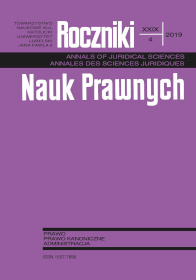Autonomia trybunałów kościelnych w Polsce w orzekaniu nieważności małżeństwa kanonicznego: przyczynek do analizy zagadnienia
Autonomy of Ecclesiastical Tribunals Pronouncing the Nullity of Canonical Marriage: a Trigger for an Analysis of the Problem
Author(s): Piotr RygułaSubject(s): Law, Constitution, Jurisprudence, Canon Law / Church Law
Published by: Towarzystwo Naukowe KUL & Katolicki Uniwersytet Lubelski Jana Pawła II
Keywords: nullity of canonical marriage; ecclesiastical tribunal; autonomy of ecclesiastical tribunals; secret in canon law
Summary/Abstract: According to Article 25, Paragraph 3 of the Constitution of the Polish Republic of 2 April 1997, “the relationship between the State and churches and other religious organizations shall be based on the principle of respect for their autonomy and the mutual independence of each in its own sphere.” The consequences of the principles of independence and autonomy of the State and the Church, which assume a reciprocal acceptance of independent legal systems within limits decided by both sides, are the guarantees included in Article 10 of the Concordat. In that Article, pronouncing judgments concerning canonical marriage is left to ecclesiastical jurisdiction, and, in an analogical way, pronouncing judgments concerning concordat marriage – to state jurisdiction. In practice, it means that a sentence of a civil tribunal pronouncing the divorce has no legal consequences in the sphere of canon law, while pronouncing the nullity of marriage by a Catholic tribunal does not influence the civil status of that marriage.In order to preserve autonomy of ecclesiastical tribunals it is very important that non-ecclesiastical subjects refrain from interfering with the process of collecting evidence by an ecclesiastical tribunal and from using the gathered material outside of canonical courts (for instance, in civil cases or criminal cases in state courts). The secret ought to be kept not only by employees of ecclesiastical courts, attorneys and experts, but also by the parties in litigation. The author of this paper devotes a lot of attention to this issue.A sentence of an ecclesiastical tribunal determines the range of possibilities of participating in the sacramental life of the Catholic Church by the parties to a case. In fact, the legal consequences of a canonical sentence refer not only to the possibility of getting married with a third party by the parties in litigation (or to the lack of this possibility). They also relate to the possibility of going to confession or receiving the Holy Communion. From this perspective, preserving autonomy of ecclesiastical tribunals in the sphere of the nullity of marriage is a fundamental issue when it comes to the constitutional freedoms of conscience and religion of persons remaining under the jurisdiction of those tribunals.
Journal: Roczniki Nauk Prawnych
- Issue Year: 29/2019
- Issue No: 4
- Page Range: 155-172
- Page Count: 18
- Language: Polish

